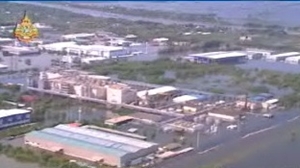BANGKOK, Nov 18 – The Bank of Thailand (BoT) may consider cutting the key interest rate at its next meeting on Nov 30 to stimulate the post-flood economy if flood impacts on the economy worsen than expected, Dr Prasarn Trairatvorakul, the BoT governor said.
The Nov 30 meeting will be this year’s last for the Monetary Policy Committee (MPC).

The BoT governor explained that a series of policy interest rate hikes at the MPC’s previous meetings had seen its current policy interest rate relatively close to the 2012 inflation target rate at 3.5 per cent.
In the post-flood period, goods transport will return to normal as well as spending on consumer goods and at retail businesses.
The government’s stimulus measures in the fourth quarter of this year will boost domestic demand.
However, the BoT is concerned about the investment sector, which may recover later than expected in the second quarter of 2012.
Regarding the Thai baht, the central bank governor said the currency unit remains stable at 30.80 baht against the US dollar. Pressure on the Thai baht is investors’ concern on risks in holding assets and shares in the emerging market. As a result, they have sold assets to hold the US dollar instead.
Movements of the Thai baht are not of concern, however, as the country’s foreign reserves remain high and Thailand’s fundamentals are better than those of the United States and Europe, the governor said.
Compensation paid to flood victims by foreign insurance companies may increase Thailand’s money inflow and is likely to cause some baht appreciation in the short term. The money will then be used to buy machinery and equipment for post-flood rehabilitation of the industry.
Compensation for flood damage is not likely to surpass Bt200 billion, not so high when converted to the US dollar, at about US$6.6 billion.
“Unclear recovery of major economies was the main factor putting pressure on the currency exchange market. Consequently, the market must keep a close watch on the crisis in Europe whether it will impact financial institutions or not, as it may cause Thai baht volatility,” Mr Prasarn said.




